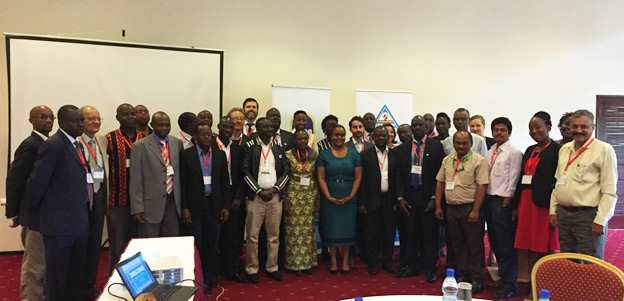UGANDA WORKSHOP ON ETHANOL STANDARDS
The American National Standards Institute, through its public-private partnership with USAID called the Standards Alliance, organized an ethanol standards workshop in Kampala, Uganda on November 15. The Uganda National Bureau of Standards (UNBS) served as co-host
for the workshop, while ASTM International and POET served as co-sponsors and co-organizers. The one-day workshop enabled a technical exchange on the ASTM International standard for ethanol as a home cooking and appliance fuel.
In East Africa, the household cooking sector is the main consumer of solid biomass, representing the largest share of final energy consumption in the region. In Uganda, biomass fuels account for more than 91 percent of all energy use, and 97 percent of the population uses solid fuels for cooking.
While traditional biomass fuels such as wood and crop residue are renewable in principle, the current level of usage is not sustainable and contributes to massive deforestation and negative health impacts. In 2012, an estimated 35 million Ugandans were affected by household air pollution from indoor
smoke and airborne particles as a result of cooking with solid fuels. This exposure led to more than 13,000 premature deaths in Uganda.
Ethanol, however, is uniquely suited for household use. When used in a proper stove, ethanol burns cleanly and efficiently, cannot explode, and cooks meals faster than traditional biomass. Cleaner, more efficient cooking fuels are an essential component of regional efforts to reduce environmental impacts of
deforestation and risks to human health, but also create an opportunity for small holder farmers to diversify their incomes through access to a second market.
The promise of ethanol cannot be achieved without a sound technical and policy framework to support the production, sale and distribution of ethanol. In addition to technical standards and conformity assessment that address the performance and safety requirements for ethanol, taxes and tariffs on ethanol also
need to be addressed before an enabling business environment can be realized.
The November 15 Standards Alliance training session, entitled “Ethanol as a Home Cooking and Appliance Fuel Technical Standard” featured presentations from the U.S. and Ugandan public and private sector. The workshop started with a presentation from UNBS discussing the need for standards and the
role of UNBS, as well as the standards development process. Next, speakers from POET discussed the content of ASTM Standard E3050 for denatured ethanol for use as a clean cooking fuel and appliance, as well as the structure of POET’s ethanol production business,
its work in Haiti, and the potential for ethanol production and use in Africa. A representative from CLASP spoke next about how standards and labelling can support the use of efficient appliances, especially cook stoves.
Kakira Sugar representatives also spoke about their new ethanol plant based in Uganda, as well as market opportunities and challenges for deploying their product. Finally, a speaker from the Ministry of Energy spoke about the legal framework for supporting
ethanol as a fuel for vehicles, cook stoves and appliances in Uganda.
Materials
Photos



